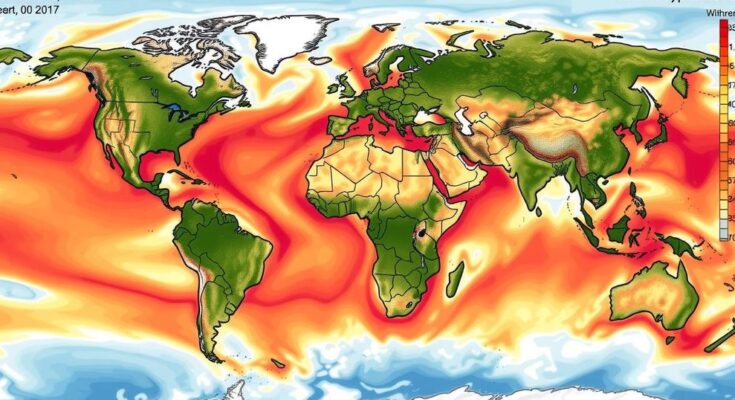NOAA announced that 2024 was the warmest year since 1850, with global surface temperatures reaching unprecedented levels. Upper-ocean heat content also hit record highs, indicating significant heat absorption by oceans. Antarctic sea ice extent was notably low, and while global tropical storm activity was slightly below average, the North Atlantic saw heightened storm intensity. Overall, the findings highlight escalating climate challenges requiring urgent action.
In 2024, the global climate continued to demonstrate alarming trends, with NOAA declaring it the warmest year on record, surpassing previous years by significant margins. The mean surface temperature reached 2.32°F (1.29°C) above the 20th-century average, with notable warm anomalies observed in the Arctic and across multiple continents. Additionally, the upper-ocean heat content saw unprecedented levels, indicating an increased capacity for heat absorption in the oceans, which store approximately 90% of excess heat in the Earth system.
Despite global warming’s effects, the year witnessed 85 named tropical storms, slightly below the average but marked by an increase in intensity in the North Atlantic. Antarctic sea ice extent remained critically low, ranking second lowest for both the annual minimum in February and maximum in September. Bilateral observations in December revealed sustained warmth, with limited snow cover and remarkably low sea ice extent across critical regions, highlighting the ongoing implications of climate change.
This comprehensive report elucidates the transportation of heat and its repercussions on climate variables across the globe, reflecting a continuous upward trend in surface and ocean temperatures, as well as its effects on snow and ice conditions. The findings hold significant relevance for various stakeholders, including government agencies and environmental organizations, engendering informed decisions regarding climate-related strategies and policies.
The year 2024 serves as a critical juncture in climate studies, marking an escalation in global temperatures and ocean heat content, challenging policymakers and scientists alike. NOAA’s records, dating back to 1850, provide a historical context against which current climatic events are analyzed. The ongoing trend of rising temperatures is corroborated by various environmental indicators, including ocean heat storage, snow cover extent, and tropical storm frequency. This data is crucial for understanding the dynamics of climate change and for anticipating future climatic scenarios, making it essential for both scientific discourse and public policy consideration. As the global community faces these unprecedented climatic shifts, the urgency for comprehensive climate action has never been more pronounced.
The climatic patterns observed in 2024 underscore the urgency of addressing global warming and its ramifications on ecosystems and human activities alike. With NOAA documenting the highest global temperatures and considerable deviations in ocean heat content, it is clear that the Earth’s climate trajectory warrants immediate and concerted efforts towards mitigation and adaptation strategies. The record low sea ice extents and erratic storm patterns not only illustrate the profound impacts of climate change but also emphasize the need for collaborative international actions to combat its effects effectively.
Original Source: www.ncei.noaa.gov




